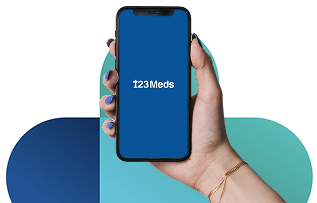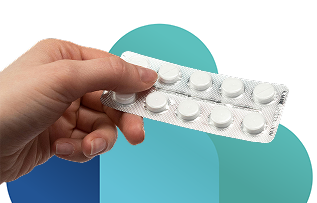Period Pain
Period pain can make daily life uncomfortable, causing cramps, fatigue, and irritability. While it’s common, effective treatments can help reduce discomfort, making it easier to stay active and feel your best during your menstrual cycle. Lifestyle changes, such as gentle exercise and heat therapy, can also support relief.
Through 123Meds, you can receive expert-approved treatments for period pain via our UK-registered online pharmacy service, with prescriptions reviewed by clinicians and delivered discreetly straight to your door.

pharmacists

consultations & orders

delivery before 3:30PM

Available Now
Period pain, also known as dysmenorrhoea, refers to cramping or aching pain in the lower abdomen that occurs before or during a menstrual period. Many people experience it as a normal part of their cycle, but for some the pain can be severe enough to interfere with daily life. Period pain is very common and usually not a sign of anything serious, though in some cases it may be linked to an underlying condition.
Period pain is caused by natural hormone-like substances called prostaglandins, which trigger the womb to contract and shed its lining. Higher levels of prostaglandins can cause stronger contractions, leading to more intense pain. Some people are more prone to painful periods, especially younger women and those with heavy periods.
Sometimes, severe or worsening period pain may be due to conditions such as endometriosis, fibroids, or pelvic infections. That’s why it’s important to pay attention to new or unusual symptoms and seek medical advice if your pain changes or doesn’t improve with treatment.
The pain is usually felt in the lower tummy or back and may spread to the thighs. It often begins a day or two before bleeding starts and lasts for two to three days. Some people also experience nausea, headaches, tiredness, or diarrhoea alongside cramping.
You should seek medical advice if period pain suddenly becomes much worse than usual, if it does not improve with pain relief, or if you develop symptoms such as very heavy bleeding, irregular periods, fever, or unusual vaginal discharge.
For mild period pain, simple measures such as using a hot water bottle, taking gentle exercise, or practising relaxation techniques may help. Over-the-counter painkillers like ibuprofen or paracetamol are often effective for occasional cramps.
For more severe symptoms, stronger anti-inflammatory medicines may be prescribed. Mefenamic acid and naproxen are non-steroidal anti-inflammatory drugs (NSAIDs) that work by reducing prostaglandin production, easing both pain and menstrual bleeding. These medicines are usually taken during the days of your period when pain is at its worst.
Our service provides mefenamic acid and naproxen for adults with period pain who are suitable for treatment. Always read the patient information leaflet that comes with your medicine. If you experience sudden shortness of breath, chest pain, severe headache, vision changes, or swelling in one leg while taking NSAIDs, seek urgent help immediately via NHS 111, your GP, or A&E. If your period pain is severe, persistent, or accompanied by new symptoms, you should arrange a review with your GP to rule out underlying conditions
What is period pain?
Period pain, also called dysmenorrhoea, is common and affects many women and people who menstruate. It usually feels like cramping in the lower abdomen, though pain may also spread to the back and thighs. Some people experience headaches, nausea, or fatigue alongside the cramps.
What causes period pain?
Most period pain is caused by the womb contracting to help shed its lining during menstruation. These contractions are triggered by hormone-like substances called prostaglandins. Higher levels of prostaglandins can cause stronger contractions and more severe pain. Sometimes, period pain may be linked to conditions such as endometriosis, fibroids or pelvic inflammatory disease.
How can I relieve period pain?
Mild to moderate period pain often improves with self-care, such as applying heat to the tummy or lower back, gentle exercise, relaxation techniques, or over-the-counter pain relief like ibuprofen or paracetamol. If your pain is more severe, we can provide tailored treatment and advice, including prescription options when appropriate.
When should I seek medical advice for period pain?
You should speak to a doctor if your period pain is very severe, does not improve with standard pain relief, or is affecting your daily activities. You should also seek advice if your periods have suddenly become more painful, if you have heavy bleeding, or if you notice pain at other times in your cycle. These symptoms could suggest an underlying condition that needs investigation.
Is period pain normal?
Mild period pain is common and usually nothing to worry about. However, severe or worsening pain is not something you should ignore and medical evaluation should be sought from your GP. With the right assessment and treatment, we can help you manage your symptoms and improve your quality of life.
Fill out a quick form!
Fast, safe online consultations – no need to visit a GP or pharmacy.

Select your medication
Once you’ve completed the assessment, we’ll show you treatments that are right for you.

Prescriber review
Our prescribers will review your consultation and, if it's right for you, send a prescription to our pharmacy.

Express Delivery
Discreet delivery straight to your door, as soon as the next day.

Our 5-Point Safety Guarantee
We focus on trust, privacy, and expert service in online medication ordering.
GPHC and MHRA Regulated Pharmacy
Regulated by all necessary UK regulatory bodies
UK qualified Pharmacists
All consultations reviewed by UK pharmacists
Authentic Medication
Sourced from approved suppliers only
Customer Care
Customer care team available via email or phone
Trusted by Thousands
Thousands of satisfied customers

pharmacists

consultations & orders

delivery before 3:30PM

Available Now

